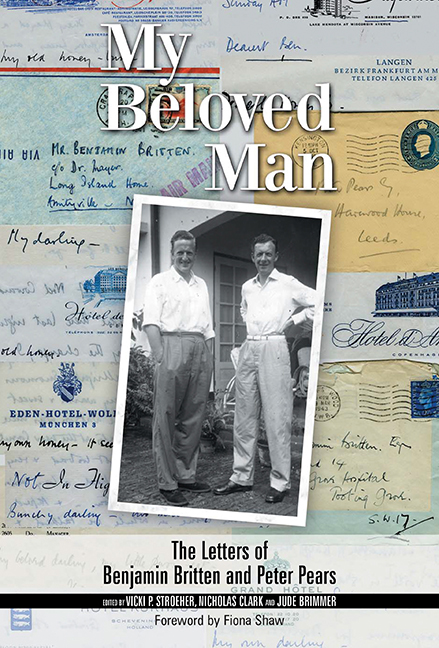Book contents
- Frontmatter
- Dedication
- Frontispiece
- Contents
- List of Plates
- List of Illustrations
- Foreword by Fiona Shaw
- Acknowledgements
- Editorial Note
- Introduction: Britten and Pears's ‘personal and consistent’ Correspondence
- THE LETTERS
- I ‘When I am not with you’: August 1937 to January 1941: Letters 1–12
- II ‘My life is inextricably bound up in yours’: May 1942 to November 1944: Letters 13–70
- III ‘I don't know why we should be so lucky, in all this misery’: July 1945 to April 1949: Letters 71–125
- IV ‘You are potentially the greatest singer alive’: Late 1949 to January 1954: Letters 126–88
- V ‘Why shouldn't I recognise that you are such a large part of my life’: May 1954 to December 1959: Letters 189–246
- VI ‘Far away as you are, at least I feel there is contact!’: January 1960 to March 1968: Letters 247–313
- VII ‘It is you who have given me everything’: January 1970 to June 1975: Letters 314–53
- VIII ‘My days are not empty’: January to November 1976: Letters 354–65
- Personalia
- List of Works
- Select Bibliography
- General Index
- Plate section
III - ‘I don't know why we should be so lucky, in all this misery’: July 1945 to April 1949: Letters 71–125
from THE LETTERS
Published online by Cambridge University Press: 05 July 2016
- Frontmatter
- Dedication
- Frontispiece
- Contents
- List of Plates
- List of Illustrations
- Foreword by Fiona Shaw
- Acknowledgements
- Editorial Note
- Introduction: Britten and Pears's ‘personal and consistent’ Correspondence
- THE LETTERS
- I ‘When I am not with you’: August 1937 to January 1941: Letters 1–12
- II ‘My life is inextricably bound up in yours’: May 1942 to November 1944: Letters 13–70
- III ‘I don't know why we should be so lucky, in all this misery’: July 1945 to April 1949: Letters 71–125
- IV ‘You are potentially the greatest singer alive’: Late 1949 to January 1954: Letters 126–88
- V ‘Why shouldn't I recognise that you are such a large part of my life’: May 1954 to December 1959: Letters 189–246
- VI ‘Far away as you are, at least I feel there is contact!’: January 1960 to March 1968: Letters 247–313
- VII ‘It is you who have given me everything’: January 1970 to June 1975: Letters 314–53
- VIII ‘My days are not empty’: January to November 1976: Letters 354–65
- Personalia
- List of Works
- Select Bibliography
- General Index
- Plate section
Summary
Although the war officially ended in Europe in 1945 on 8 May, its effects nonetheless persisted. The Allied victory brought rejoicing and an end to the nightly blackouts, the constant whine of sirens and the threat of air raids, but the return to ‘normal’ life was tempered by the scale of devastation and a profound sense of loss. Britten and Pears were among the fortunate, having come through the war unharmed. Moreover, they were able to carry on with their music-making. Britten had time to compose, largely uninterrupted, giving him the space needed to work on Peter Grimes.
He completed the opera, still under the shadow of war, in February 1945. Rehearsals began almost immediately and despite some tensions that arose around the work's suitability for the reopening of Sadler's Wells, there was in the press a sense of excitement about the prospect of an English opera by an English composer. Grimes was premiered on 7 June and propelled Britten and Pears to new heights, solidifying their reputations both at home and abroad. In July 1945 the composer embarked on a tour with violinist Yehudi Menuhin to play for the survivors at Bergen-Belsen and other German concentration camps. Upon witnessing the most appalling consequences of the war, he acknowledged his and Pears's good fortune, mixed with a sense of guilt and disbelief: ‘I don't know why we should be so lucky, in all this misery’ (Letter 72).
Ultimately, their efforts to produce Grimes and the operas that followed led to the founding of their own opera company in December 1946, the English Opera Group (EOG) and the Aldeburgh Festival of Music and the Arts (1948), in which their musical partnership was a central focus. The Festival was Pears's idea, the fruit of discussions following a financially disastrous July 1947 tour by the EOG to Holland and Switzerland, in which the group lost around £3,000. In response, Pears brought up the idea of a homegrown festival: ‘Why not make our own festival? A modest Festival with a few concerts given by friends? Why not have an Aldeburgh Festival?’1 The questions were timely, for the EOG was in need of a home base.
- Type
- Chapter
- Information
- My Beloved ManThe Letters of Benjamin Britten and Peter Pears, pp. 89 - 148Publisher: Boydell & BrewerPrint publication year: 2016

